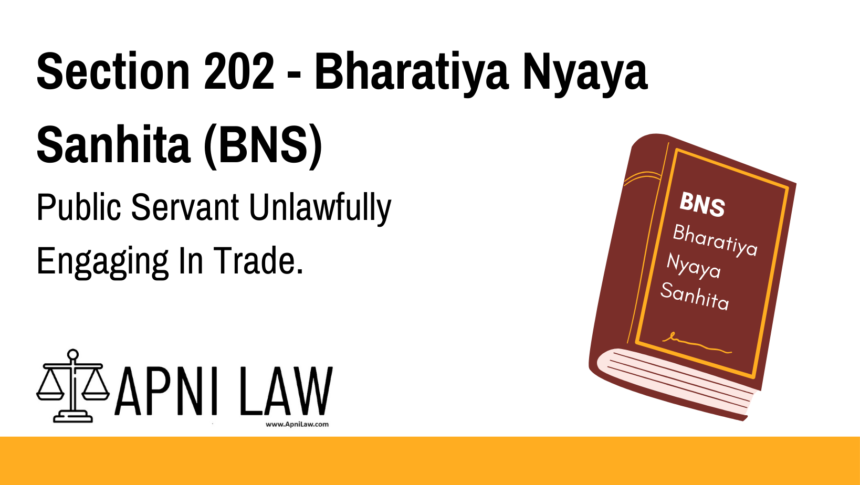Code:
Whoever, being a public servant, and being legally bound as such public servant
not to engage in trade, engages in trade, shall be punished with simple imprisonment for a
term which may extend to one year, or with fine, or with both or with community service.
Explanation of Section 202 BNS
Section 202 of the Bharatiya Nyaya Sanhita (BNS), 2023, prohibits public servants from engaging in trade or commercial activities when they are legally bound not to do so. This law ensures that government officials focus on their duties without any conflict of interest.
Key Elements of the Offense:
- Public Servant Status: The accused must be a public servant.
- Legal Restriction: The person must be legally prohibited from engaging in trade.
- Violation: The public servant engages in trade despite the restriction.
- Punishment:
- Simple imprisonment for up to one year, or
- Fine, or
- Both imprisonment and fine, or
- Community service.
This law protects government integrity by preventing officials from misusing their position for financial gain.
Illustration
Example 1: A Government Official Running a Business
A district magistrate secretly owns and operates a construction company, even though their service rules prohibit them from engaging in private trade. This makes them liable under Section 202 BNS.
Example 2: A Police Officer Engaging in Side Business
A police officer, while in service, runs an import-export business in a family member’s name but manages the operations. Since the officer is legally bound not to engage in trade, this violates Section 202 BNS.
Common Questions and Answers on Section 202 BNS
1. Who can be prosecuted under Section 202 BNS?
Only public servants who are legally prohibited from engaging in trade but still do so can be prosecuted under this section.
2. What is the purpose of this law?
This law ensures that public servants remain free from conflicts of interest and do not misuse their position for financial gain.
3. What is the punishment under this section?
The punishment includes:
- Up to one year of simple imprisonment, or
- Fine, or
- Both imprisonment and fine, or
- Community service.
4. Can a public servant invest in the stock market?
It depends on the rules governing their service. While general investments may be allowed, active business operations or stock trading as a profession may violate this section.
5. Can a retired public servant start a business?
Yes. After retirement, a public servant is no longer legally bound by service rules prohibiting trade.
Related Sections in BNS
- Section 201 BNS – Public servant framing an incorrect document to cause injury.
- Section 204 BNS – Destruction of a document to prevent its production as evidence.
Conclusion
Section 202 BNS reinforces ethical governance by preventing public servants from engaging in private business that may create conflicts of interest. This ensures that government officials remain dedicated to their public duties without any financial bias.
For expert legal advice, visit ApniLaw today! 🚀








